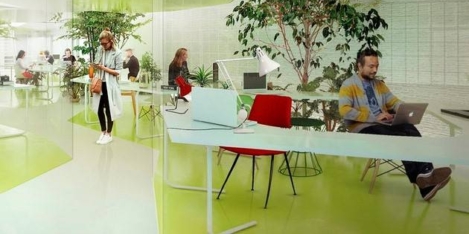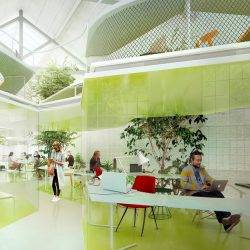April 9, 2018
Rising demand for Grade A office space helps sustain Edinburgh commercial property market
 Technology, media, and telecommunications (TMT) companies are continuing to play a prominent role within Edinburgh’s office market, accounting for approximately 30 percent of transactions in the city. But rising demand for Grade A office space in Edinburgh by a variety of organisations, including coworking, private and public sector tenants has fuelled significant occupier demand during the first quarter of 2018, according to analysis by property consultancy, Knight Frank. The latest commercial property figures show approximately 460,000 sq. ft. of new occupier requirements came onto the market in the first three months of the year from companies looking to lease office space in Edinburgh. (more…)
Technology, media, and telecommunications (TMT) companies are continuing to play a prominent role within Edinburgh’s office market, accounting for approximately 30 percent of transactions in the city. But rising demand for Grade A office space in Edinburgh by a variety of organisations, including coworking, private and public sector tenants has fuelled significant occupier demand during the first quarter of 2018, according to analysis by property consultancy, Knight Frank. The latest commercial property figures show approximately 460,000 sq. ft. of new occupier requirements came onto the market in the first three months of the year from companies looking to lease office space in Edinburgh. (more…)










 Over a fifth (21 percent) of 18-24 year olds admit that they have rejected a potential employer because of the poor design of the office or lack of amenities available, while 34 percent in the same age group would be willing to commute for a maximum of one hour each way to an office that is considered perfect – compared to 22 percent of 45-54 year olds. The research, commissioned by Mindspace, found that 16 percent of 18-24 year olds have actually left a job because of how poorly designed the office was in one of their previous roles. Overall, nearly a third (31 percent), of workers are bored with their current office environment and feel uninspired at work, with 28 percent of workers describing their place of work outdated and dull. The research also found that while most workers had access to amenities such as a kitchen (72 percent), meeting rooms (66 percent) and free tea & coffee (53 percent), what UK office workers desire the most to improve morale is more natural light, air conditioning and improved interior lighting.
Over a fifth (21 percent) of 18-24 year olds admit that they have rejected a potential employer because of the poor design of the office or lack of amenities available, while 34 percent in the same age group would be willing to commute for a maximum of one hour each way to an office that is considered perfect – compared to 22 percent of 45-54 year olds. The research, commissioned by Mindspace, found that 16 percent of 18-24 year olds have actually left a job because of how poorly designed the office was in one of their previous roles. Overall, nearly a third (31 percent), of workers are bored with their current office environment and feel uninspired at work, with 28 percent of workers describing their place of work outdated and dull. The research also found that while most workers had access to amenities such as a kitchen (72 percent), meeting rooms (66 percent) and free tea & coffee (53 percent), what UK office workers desire the most to improve morale is more natural light, air conditioning and improved interior lighting.




 City centre take up reached 1,005,000 sq ft in Birmingham last year, 51 percent above the 10-year average of 666,000 sq ft which marked a record year, according to Savills Research. Growth was driven in part by the Government Property Unit (GPU) deal, as public services accounted for 27 percent of take-up in the city centre last year, including the 237,000 sq ft pre-let at Arena Central. Birmingham’s boom was also boasted by take-up from serviced office providers that reached 208,000 sq ft during 2017, the highest level on record and this accounted for 21 percent of the total take-up, more than any other regional city. There now remains a shortage of Prime Grade A space in Birmingham city centre following a number of large lettings. Prime Grade A space now stands at only 169,000 sq ft, enough for only six months of take-up at average levels. Major construction project, Three Snowhill won’t complete until the second quarter of next year, when it will deliver 420,000 sq ft of much needed Grade A office space on its completion. Until then, competition among occupiers will further intensify for Grade A space.
City centre take up reached 1,005,000 sq ft in Birmingham last year, 51 percent above the 10-year average of 666,000 sq ft which marked a record year, according to Savills Research. Growth was driven in part by the Government Property Unit (GPU) deal, as public services accounted for 27 percent of take-up in the city centre last year, including the 237,000 sq ft pre-let at Arena Central. Birmingham’s boom was also boasted by take-up from serviced office providers that reached 208,000 sq ft during 2017, the highest level on record and this accounted for 21 percent of the total take-up, more than any other regional city. There now remains a shortage of Prime Grade A space in Birmingham city centre following a number of large lettings. Prime Grade A space now stands at only 169,000 sq ft, enough for only six months of take-up at average levels. Major construction project, Three Snowhill won’t complete until the second quarter of next year, when it will deliver 420,000 sq ft of much needed Grade A office space on its completion. Until then, competition among occupiers will further intensify for Grade A space.






 Demand for office space in Scotland’s three largest cities pushed overall take-up beyond 2m sq ft last year, aided by a solid final quarter of occupational deals in Aberdeen and Glasgow, and an all-time record year for Edinburgh. Scotland’s offices market in 2017 reach ed2.4 million sq ft, 14 percent above the 10 year average, according to the latest Scottish Office Spotlight from Savills. In Edinburgh (city centre and wider market) office take-up amounted to a record 1.1 million sq ft boosted by the ongoing growth of tech in the city. According to data from Stack Overflow, the Scottish capital saw a 19 percent increase in data scientists employed in the city centre over the course of 2017. Activity places further pressure on supply with only 220,000 sq ft of Grade A now available which Savills suggests will push top rents to £34 per sq ft in 2018. Keith Dobson, director in the business space agency team at Savills in Edinburgh, says: “The soon to be completed 40,000 sq ft office scheme at 2 Semple Street will ease pent up demand come Q2 2018, whilst The Mint Building and Capital Square will complete in 2019 and 2020 respectively.”
Demand for office space in Scotland’s three largest cities pushed overall take-up beyond 2m sq ft last year, aided by a solid final quarter of occupational deals in Aberdeen and Glasgow, and an all-time record year for Edinburgh. Scotland’s offices market in 2017 reach ed2.4 million sq ft, 14 percent above the 10 year average, according to the latest Scottish Office Spotlight from Savills. In Edinburgh (city centre and wider market) office take-up amounted to a record 1.1 million sq ft boosted by the ongoing growth of tech in the city. According to data from Stack Overflow, the Scottish capital saw a 19 percent increase in data scientists employed in the city centre over the course of 2017. Activity places further pressure on supply with only 220,000 sq ft of Grade A now available which Savills suggests will push top rents to £34 per sq ft in 2018. Keith Dobson, director in the business space agency team at Savills in Edinburgh, says: “The soon to be completed 40,000 sq ft office scheme at 2 Semple Street will ease pent up demand come Q2 2018, whilst The Mint Building and Capital Square will complete in 2019 and 2020 respectively.”
 Over half of UK workers (53 percent) say that the standard of technology is a key consideration for accepting a new job role and more than 1 in 3 (37 percent) would decline a job based on poor hardware alone, claims a new survey. The survey of over 2,000 British adults carried out by gadgets and technology e-tailer, LaptopsDirect.co.uk found that having the latest technology was valued more than other office perks, such as flexible working (45 percent), the working environment/decor (39 percent) and staff discounts (33 percent). Nearly a quarter of respondents (74 percent) overall, believe technology makes them more productive at work, with workers in marketing valuing technology the highest, with 84 percent of the votes, followed by those in creative and photographic (81 percent), information and communications (78 percent), professional services (73 percent) and education (71 percent).
Over half of UK workers (53 percent) say that the standard of technology is a key consideration for accepting a new job role and more than 1 in 3 (37 percent) would decline a job based on poor hardware alone, claims a new survey. The survey of over 2,000 British adults carried out by gadgets and technology e-tailer, LaptopsDirect.co.uk found that having the latest technology was valued more than other office perks, such as flexible working (45 percent), the working environment/decor (39 percent) and staff discounts (33 percent). Nearly a quarter of respondents (74 percent) overall, believe technology makes them more productive at work, with workers in marketing valuing technology the highest, with 84 percent of the votes, followed by those in creative and photographic (81 percent), information and communications (78 percent), professional services (73 percent) and education (71 percent).








March 13, 2018
Many office furniture firms remain confused about social media and online communication
by Colin Watson • Comment, Furniture, Workplace design
(more…)